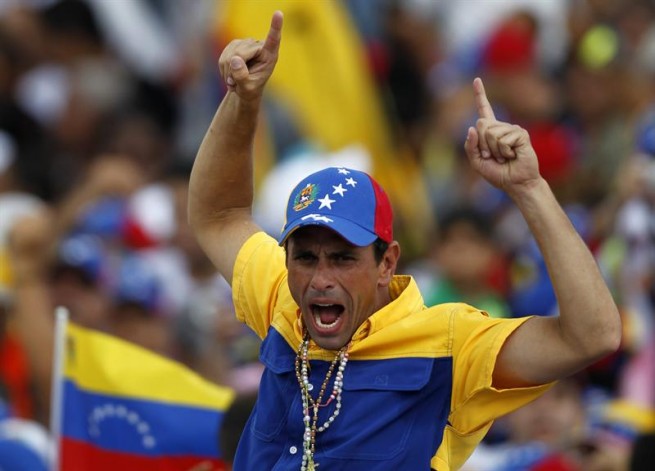CARACAS, (Reuters) – Venezuelan opposition leader Henrique Capriles distanced himself from post-election street violence after seven fatalities threatened to turn the South American OPEC nation’s vote dispute into a full-blown crisis.
Capriles had planned to lead a march on the National Electoral Council (CNE) on Wednesday to demand a recount after official results gave a narrow win to Nicolas Maduro, the chosen successor of late socialist leader Hugo Chavez.
But the opposition leader canceled the rally on Tuesday, saying the government had plotted to “infiltrate” it, start trouble and blame it on him.
“To all my followers … this is a peaceful quarrel. Whoever is involved in violence is not part of this project, is not with me,” Capriles told reporters. “It is doing me harm.”
The government earlier said seven people were killed on Monday and accused Capriles’ supporters of attacking ruling Socialist Party offices and people celebrating Maduro’s victory.
Maduro earlier accused the opposition of trying to trigger a coup d’etat and said he would not allow the planned march to go ahead. His government is threatening legal action against Capriles.
About 135 people were arrested and more than 60 hurt during Monday’s violent clashes, including one woman whom a mob tried to burn alive, officials said.
In one well-off Caracas neighborhood, police fired teargas and rubber bullets to disperse masked youths who chanted “fraud” as they blocked streets, burnt tires and threw stones.
Protests were much quieter on Tuesday with thousands of Capriles’ followers holding peaceful rallies outside CNE offices around the country.
Capriles says the government is responsible for the violence because it denied his camp’s demands for a full recount.
Maduro won with 50.8 percent of the vote against Capriles’ 49.0 percent, according to the electoral authority. He is due to be formally sworn in on Friday.
A continuation of violent protests could hurt the opposition’s democratic standing, despite having achieved its best showing in a presidential poll since the Chavez era began, and just as Capriles has consolidated himself as its leader.
The government has forcefully denounced the violence as part of a “fascist” plan to destabilize the country and set the stage for a re-run of a brief 2002 coup against Chavez.
Maduro held a meeting on Tuesday with senior executives of state oil company PDVSA, who stood up to chant “They won’t return!”, referring to politicians who ruled before Chavez won power in 1998 and launched his self-styled socialist revolution.
IRREGULARITIES
Maduro campaigned for election on a promise to continue his late boss’s hardline socialist policies. He had a big lead in polls but that evaporated in the final days and the result was much closer than his team had expected.
Capriles says he is sure he won the election and that his team has evidence of 3,200 irregularities, from voters using fake IDs to intimidation of volunteers at polling centers.
Opposition sources say their count showed Capriles received an extra 300,000 to 400,000 votes that did not appear in the official tally.

The CNE has refused to hold a recount, saying an audit of ballots from 54 percent of the polling centers, in a widely respected electronic voting system, had already been done.
Maduro initially said he was open to a recount but has changed his position. He has called on his supporters to demonstrate all week, culminating in a big rally in Caracas on Friday to coincide with his inauguration ceremony.
He jumped on Capriles’ cancellation of Wednesday’s march, saying the opposition leader had started to “backpedal.”
“But no matter how much they retreat, they’ll have to face justice sooner rather than later,” Maduro said before turning on Capriles. “You are responsible for this. Don’t disguise yourself as a pacifist.”
In a session of Congress on Tuesday, ‘Chavista’ legislators accusing Capriles of inciting bloodshed and called for him to face a formal investigation and charges. Two opposition lawmakers said they were insulted and punched by pro-government legislators.
Maduro’s slight margin of victory has raised doubts about whether the disparate alliance that formed around Chavez during his 14 years in power can hold together without him.
